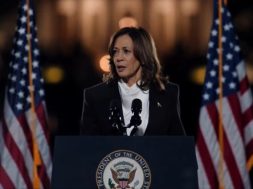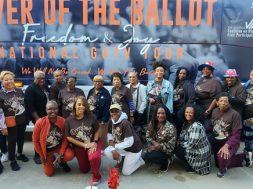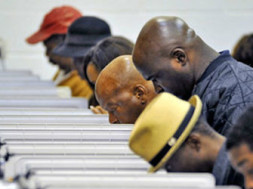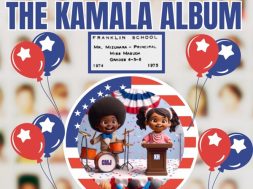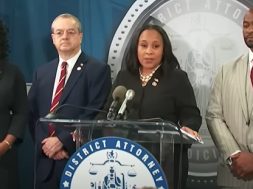
What constitutes a black leader?

Indeed, during the 20 years since he thrust himself into the national spotlight while supporting Tawanna Brawley, the black teenager who later admitted lying about being raped by a group of white men, Sharpton has morphed into the mainstream media’s first choice to weigh in on almost any political or social issue involving race. While such has helped him earn a good living in addition to being considered by some within the same media as “the” leader—a descendant of Martin and Jesse—the question that begs answering is whether being the so called “black” or “minority” leader, on any level of politics, is too limiting or too patronizing?
Excluded from my analysis are leaders of groups whose sole purpose is to advocate for civil rights like the NAACP, the Anti-Defamation League or La Raza, to name a few.
And I certainly am aware of the fact that at least with respect to so called “black” leaders that historically speaking, when the black educated class was still small, that the most educated blacks within a given community were pastors who were sought out by political parties and machines to deliver their congregations to the polls.
Today, however, most educated blacks would find the notion that they have to vote as “brother or sister pastor” says either offensive or misplaced, although there is still rampant evidence that bloc voting, at least with respect to party, is still in vogue among likely black voters.
This fact made the 2008 Democratic primary interesting because, at least in the early months of the campaign, the Congressional Black Caucus was almost evenly split among members supporting Hillary Clinton and Barack Obama. In fact, if it is true that to the victors goes the spoils, conventional wisdom holds that U.S. Senate candidate Kendrick Meek, who is struggling in his fight for the nomination against billionaire Jeff Greene, has only received tepid support from the Obama administration because of his support of Clinton throughout the primary.
Despite this fact, there are Meek supporters, including Representative Alcee Hastings, who believe that Obama should do more to help Meek on account of his chance to become Florida’s first black senator.
Is such identity politics still necessary or viable considering the rise of Obama, who would not have been elected president but for millions of white and Latino voters’ eschewed color when casting their vote for him in the general election?
Back during my junior year at Atlanta’s Morehouse College, the alma mater of Dr. Martin Luther King, Jr. among other prominent civil rights legends, each Thursday, the entire student body was required to attend services as King Chapel, where we were feted by speeches from prominent national and world leaders. I distinctly remember the morning that the keynote speaker was Andrew Young, a former King aide who later served as Atlanta Mayor and Ambassador to the United Nations. After the service, I asked him what advice he could give to me to prepare myself in the event I ever wanted to enter politics. I will never forget his response that it was critical that I and others in my generation focus on becoming “leaders”, not just “black leaders.” Young, who later ran unsuccessfully for governor, further opined that being a black leader was too limiting and that it belied the reality that in the political realm, what affects one group invariably affects all.
Which helps segue to my next question, which is the legitimacy, or lack thereof, of the so-called “black agenda” Indeed, some of President Obama’s harshest critics are those on the left who believe that he has not advocated a “black agenda.”
In defense of the president, I have never received a memo outlining such an agenda. What may concern me the most, such as lower business and personal taxes to boost spending on goods and services, may not register on the hierarchy of needs for a client of mine struggling on welfare.
If my experiences have taught me nothing else, it is that the very items on the so-called “black agenda” being espoused by “black leaders” actually affect all races—infant mortality, poor education, high incarceration rates, each endemic of plagues within lower economic areas regardless of race.
Even Affirmative Action, which has long been considered sacrosanct among African Americans, is now subject to a more nuanced analysis among many well-to-do blacks who, like President Obama often states, believe that their kids, born to privilege, should not benefit from strictly race based set asides.
Yet, to further illustrate the point, it is critical for leaders regardless of race to ensure that race neutral measures are implemented to ensure fairness in educational and lucrative governmental contracting opportunities because strong minds and strong businesses build strong communities, an idea that, as Americans, we should all support.
Charles E. “Chuck” Hobbs II is a trial lawyer and political columnist based in Tallahassee, Florida. Over the past ten years he has served as counsel in a number of high profile cases. Hobbs is a freelance writer and political commentator who has appeared on CNN, Fox News and the E! Network.

